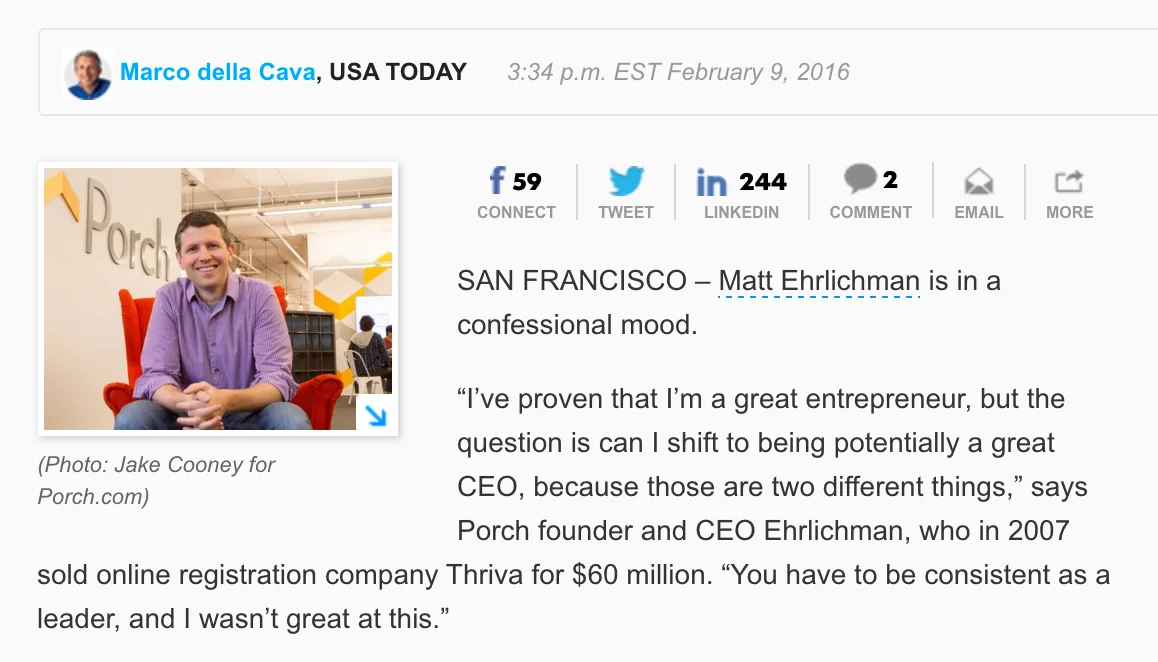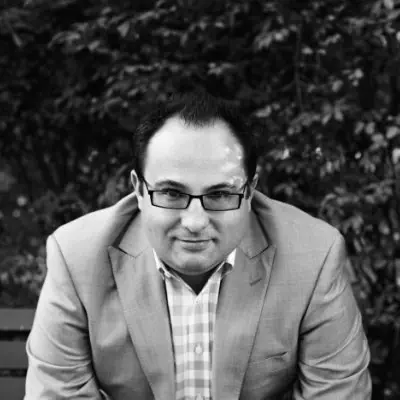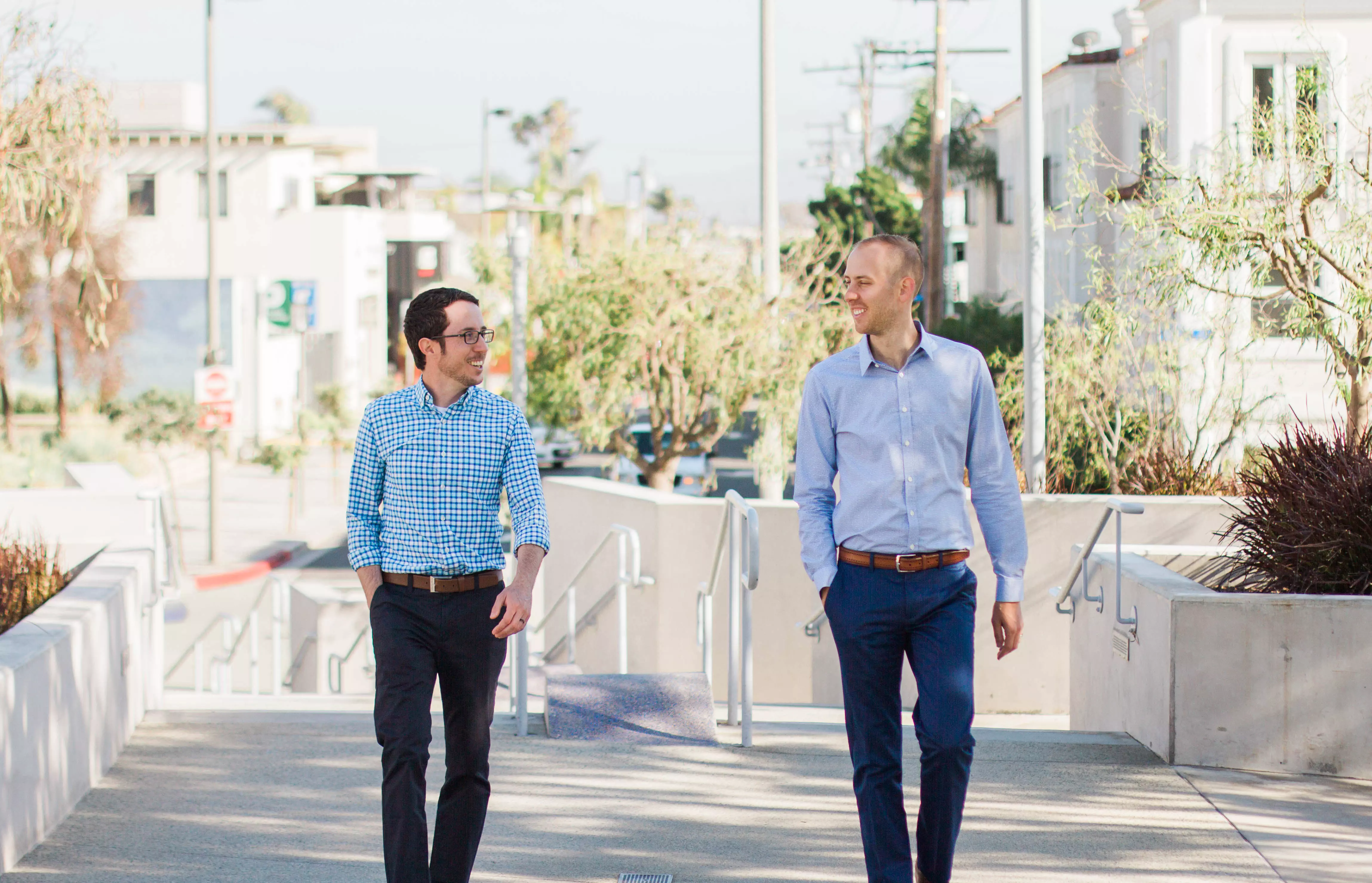 A few weeks ago I reached out to the CEO of Porch.com to invite him as a guest on the “From Founder To CEO” podcast. My home contractor asked me evaluate him on Porch. I had never heard of the website before, but gladly created an account and gave him some high marks for the work his team performed at our home (It’s Dan Landon at Home Solutions Handyman, if you are looking for someone great in Cincinnati).
A few weeks ago I reached out to the CEO of Porch.com to invite him as a guest on the “From Founder To CEO” podcast. My home contractor asked me evaluate him on Porch. I had never heard of the website before, but gladly created an account and gave him some high marks for the work his team performed at our home (It’s Dan Landon at Home Solutions Handyman, if you are looking for someone great in Cincinnati).
I was really impressed by the site, its mission, and the experience. Readers of this blog will not be surprised by my immediate reaction…I needed to find the leader behind this great work and get him on the show so we can all learn from him.
His team was quick to respond to the invitation. They were extremely professional, kind, accommodating, and very appreciative of the opportunity.
A few days later I saw a headline in USA TODAY that caught my attention. It read, “Porch CEO on rough year: ‘We got distracted.’” My first thought was, “Who is this CEO that is publicly announcing such a thing?” Then I realized that it was Matt Ehrlichman, my Founding CEO guest scheduled to speak with me the next day. The article was even more interesting.
The USA TODAY article went on to describe the 20% employee reduction and other challenges that Matt and his team confronted in 2015. It was a good article and I was even more excited to speak with Matt after reading it.
Why was I so intrigued and excited? In my experience as an executive coach, it’s rare for CEOs to admit mistakes. It is even more rare to publicly share those mistakes. Here are some additional quotes from my interview (episode 111) with Matt:
- “I just want to tell our honest story…”
- “Last year after we raised our series B…we did get distracted…”
- “One of the things I learned this year….is to understand the power of focus…”
I was struck by Matt’s humility and his intelligence. I think Matt understands something that many of my clients experience half way through a coaching engagement. Allow me to explain.
Half way through an executive coaching experience, I encourage my CEO clients to answer these two questions for their board:
- What are 2-3 things that you have learned about yourself during the first half of the coaching engagement?
- What are 2-3 things that you want to focus on during the second half of the coaching engagement?
The point of this exercise is to get some much needed feedback from the key people in the CEO’s business life. It’s also meant to align the coaching engagement around those things that all involved believe will have a bigger impact on the CEO’s success and the business’ success.
The issue? Almost every CEO I coach asks me this question: “Are you sure I should share this dimension of myself?” A conversation ensues. They typically are worried about truthfully sharing their limitations and the mistakes they may have made. This is a valid concern. But, I recommend they move forward anyway.
99% of the time, having integrity, being vulnerable, and sharing the “truth” elicits a response that is somewhat unexpected. For some board members it’s, “Gee, I have that problem too.” Or, they say, “I’m so glad you mentioned that because I was finding it hard to tell you.” They even say things like, “Of course, we know that, but we’re glad you recognize it. How can we help?” On one occasion the CEO’s entire board was in tears laughing so hard because the board chair had recently admitted a similar weakness to the board one week prior.
Integrity, Vulnerability, Truth…a powerful combination that I am privileged to witness on a weekly basis.
While this blog entry will not cite previous or original peer-reviewed research to validate this statement, my anecdotal experiences tell me that that there is a direct link between vulnerability and profitability. Why? Because when you are vulnerable it starts to build a bridge of trust between you are the people around you. For CEOs, trust is the most important currency. And, when you have that, a CEO’s job is so much easier.
Dr. Robert Cialdini knows all about this. The researcher, speaker, and author of the classic book, “Influence: Science and Practice,” reminds us of the power of sharing a weakness to better influence others. No one likes a perfect, “unrelatable” person. Getting in front of a problem, admitting your mistake, learning from it, and integrating that learning into your future plan not only builds trust, but builds confidence in you as a leader.
Back to Matt? During our interview, Matt candidly admitted the gut-wrenching decision to lay off a large number of Porch employees. But, he was honest about it, communicated the reasons, and freely admitted that it was HE who shared the largest burden of getting Porch unfocused and off track.
My guess is that Porch will continue to thrive. Matt didn’t have to publicly share his mistakes and vulnerabilities in USA TODAY nor on my podcast. But, he knew that he was setting the example for all his employees and simultaneously building trust internally and externally. I predict that because of these behaviors, Porch’s profitability will climb.
Time will tell. But, I’m betting this Founding CEO has what it takes to continue to help his team, his customers, and his partners reach new heights.
What do you think?


